

IPCC Data Distribution Centre. IPCC DDC: Climate Observations. Climate Monitoring. IPCC Reports. Click to the link below to read details: Assessment Reports: These are published materials composed of the full scientific and technical assessment of climate change, generally in three volumes, one for each of the Working Groups of the IPCC, together with their Summaries for Policymakers, plus a Synthesis Report Special Reports: These are materials that provide an assessment of a specific issue and generally follow the same structure as a volume of an Assessment ReportMethodology Reports: These are materials that provide practical guidelines for the preparation of greenhouse gas inventories Translations in non-UN languagesReporting an Error.
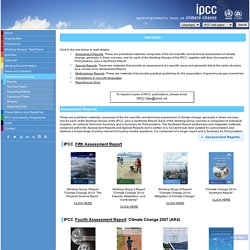
IPCC Special Reports. Click to the link below to read details: Assessment Reports: These are published materials composed of the full scientific and technical assessment of climate change, generally in three volumes, one for each of the Working Groups of the IPCC, together with their Summaries for Policymakers, plus a Synthesis Report Special Reports: These are materials that provide an assessment of a specific issue and generally follow the same structure as a volume of an Assessment Report Methodology Reports: These are materials that provide practical guidelines for the preparation of greenhouse gas inventories Translations in non-UN languages Reporting an Error These are published materials composed of the full scientific and technical assessment of climate change, generally in three volumes, one for each of the Working Groups of the IPCC, plus a Synthesis Report.
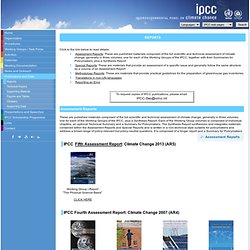
Each of the Working Group volumes is composed of individual chapters, an optional Technical Summary and a Summary for Policymakers. Cover. SREX - Special Report Extreme Events. IPCC Second Assessment Report. The Second Assessment Report (SAR) of the Intergovernmental Panel on Climate Change (IPCC), published in 1996, is an assessment of the then available scientific and socio-economic information on climate change.
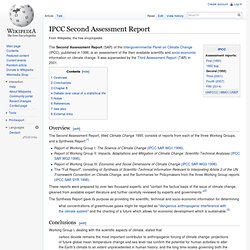
It was superseded by the Third Assessment Report (TAR) in 2001. Overview[edit] The Second Assessment Report, titled Climate Change 1995, consists of reports from each of the three Working Groups, and a Synthesis Report:[1] Report of Working Group I: The Science of Climate Change (IPCC SAR WG1 1996).Report of Working Group II: Impacts, Adaptations and Mitigation of Climate Change: Scientific-Technical Analyses (IPCC SAR WG2 1996).Report of Working Group III: Economic and Social Dimensions of Climate Change (IPCC SAR WG3 1996).The "Full Report", consisting of Synthesis of Scientific-Technical Information Relevant to Interpreting Article 2 of the UN Framework Convention on Climate Change, and the Summaries for Policymakers from the three Working Group reports (IPCC SAR SYR 1996).
IPCC Third Assessment Report - Climate Change 2001 - Complete online versions. Fourth Assessment Report: Climate Change 2007 (AR4)
Intergovernmental Panel on Climate Change. The Intergovernmental Panel on Climate Change is a huge and yet very small organization.
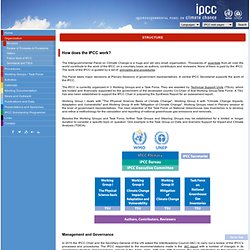
Thousands of scientists from all over the world contribute to the work of the IPCC on a voluntary basis as authors, contributors and reviewers. IPCC Working Groups. IPCC WGI. Science of Climate Change. IPCC WGII. Impacts, Adaptation and Vulnerability. IPCC WGIII. Mitigation of Climate Change. IPCC - Task Force on National Greenhouse Gas Inventories.
Intergovernmental Panel on Climate Change. The Intergovernmental Panel on Climate Change (IPCC) is a scientific intergovernmental body under the auspices of the United Nations,[1][2] set up at the request of member governments.[3] It was first established in 1988 by two United Nations organizations, the World Meteorological Organization (WMO) and the United Nations Environment Programme (UNEP), and later endorsed by the United Nations General Assembly through Resolution 43/53.
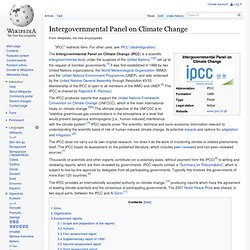
Membership of the IPCC is open to all members of the WMO and UNEP.[4] The IPCC is chaired by Rajendra K. Pachauri. The IPCC does not carry out its own original research, nor does it do the work of monitoring climate or related phenomena itself. The IPCC bases its assessment on the published literature, which includes peer-reviewed and non-peer-reviewed sources.[7] Thousands of scientists and other experts contribute (on a voluntary basis, without payment from the IPCC)[8] to writing and reviewing reports, which are then reviewed by governments. Aims[edit] Intergovernmental Panel on Climate Change.
IPCC Governance.